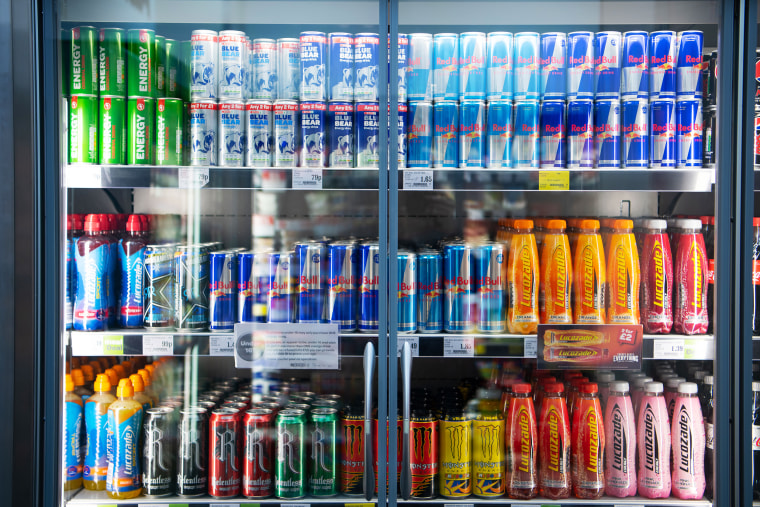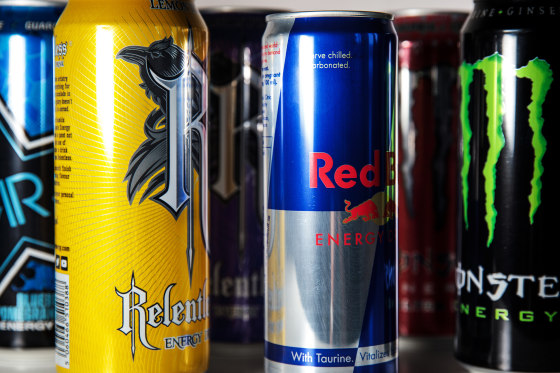The United Kingdom’s Labour Party this week released an action plan that it says will create “the healthiest generation of children ever.” Included in the 10-point plan is something public health advocates have long wanted in the United States: a ban on sales of highly caffeinated energy drinks to children under 16.
The Labour Party, which would implement its plan if it wins the U.K.’s general election next month, said the proposal would prohibit sales of energy drinks containing over 150 milligrams of caffeine per liter to kids. That means that soft drinks such as Coca-Cola, which typically has about 34 milligrams of caffeine per can, could still be purchased by those under 16 years old, while energy drinks such as Monster, which has 160 milligrams of caffeine in a 16-fluid-ounce can and often contains other stimulants, could not.
Most supermarkets in the United Kingdom already abide by a voluntary ban on the sale of energy drinks to children under 16 and require an ID to purchase them.
If the U.K. passes a mandatory ban, it will join a number of countries that regulate energy drink sales, including Poland and Latvia. The U.S., meanwhile, has no such federal regulations — and has struggled to pass restrictions at the state level, too.

The failed legislative attempts come as the energy drink market has exploded, with annual U.S. sales surging to nearly $22 billion as of mid-May, up from about $13.5 billion at the end of 2019, according to Circana, a Chicago-based market research firm.
Meanwhile, highly caffeinated beverages have made headlines for the safety concerns around them. Last month, bakery-cafe chain Panera Bread announced it was going to phase out its Charged Lemonade, a beverage with guarana extract that amounted to up to 390 milligrams of caffeine when served without ice. Lawsuits referred to the Charged Lemonade as a “dangerous energy drink” and blamed it for two deaths and at least two permanent cardiac injuries; Panera has denied wrongdoing and said it removed the beverage as part of a larger “menu transformation.”
In the last decade, legislators in Maryland, South Carolina, Indiana and elsewhere have unsuccessfully tried to pass bills that would prohibit sales of energy drinks to minors. In Connecticut, Democratic State Rep. Liz Linehan has been working since 2019 to pass legislation in her state, introducing a bill again this year that would have prohibited children under 16 from purchasing energy drinks. The bill sparked heated debate, with some state Republican legislators arguing it was government overreach and significantly amending the bill before it ultimately failed.
“I’m not just frustrated. I’m actually quite angry,” Linehan said in a phone interview Wednesday. “The health and safety of our children is being politicized.”
As energy drink sales have grown, so have worries about the beverages, with studies tying them to everything from a higher risk of mental health issues to poor sleep. A Mayo Clinic study released earlier this month suggested energy drinks may be linked to sudden cardiac arrest.
According to the Food and Drug Administration, healthy adults can generally safely consume up to 400 milligrams of caffeine a day, the equivalent of about four or five cups of coffee — but the American Academy of Pediatrics says children and adolescents should not consume caffeine, and it has specifically stated that adolescents should avoid energy drinks.
Regardless, energy drinks are more prevalent — and more caffeinated — than ever. Red Bull, which has been around for nearly four decades, contains 111 milligrams of caffeine in a 12-fluid-ounce can, while newer arrivals to the energy drink market, including Prime Energy, Ghost Energy and Celsius, each contain 200 milligrams of caffeine or more. Other energy drinks, like Bang, have 300 milligrams.
National restaurant chains have also introduced energy drinks, even as Panera faced legal troubles for its Charged Lemonade. Earlier this year, Dunkin’ debuted its Sparkd’ energy drink. And Starbucks has teased a new energy drink that it plans to introduce shortly.
The FDA does not impose regulations on energy drinks beyond what is required for other food and beverages, and it says that under the Federal Food, Drug and Cosmetic Act, energy drink manufacturers are responsible for self-monitoring caffeine levels and ensuring they are safe.
Those who support more regulation point out that energy drinks often contain stimulants such as green tea extract plus other supplements with purported health benefits that have not been extensively studied, particularly in children. They also said that high amounts of caffeine can have an outsize effect on kids.
“With kids’ medicines, antibiotics and everything, we dose by weight. So a kid who gets an energy drink, their dose per weight is going to be a lot higher than an adult,” said Dr. Mark Corkins, chair of the American Academy of Pediatrics Committee on Nutrition. “They’re getting a lot higher dose.”
The American Beverage Association, whose members represent 95% of the energy drinks sold in the U.S., said in a statement to NBC News that energy drinks are recognized as safe by food safety agencies around the world. The association added that it has had voluntary guidelines for 10 years that discourage both marketing of energy drinks to children under age 12 and sales of energy drinks in K-12 schools.
“Mainstream energy drink companies have taken proactive, voluntary steps to ensure their beverages are not marketed to children, and we provide consumers with responsible labeling of our beverages for transparency,” the American Beverage Association said. “Most of our energy drinks have far less caffeine than a similarly sized coffeehouse coffee, so singling out energy drinks for its caffeine is not only unfair but grossly misleading to consumers.”
But many people, including Wendy Kline of Maryland, still think U.S. regulators should get more involved. Kline’s 14-year-old daughter Anais Fournier, a high school freshman honors student, died after sipping two energy drinks in a 24-hour period in December 2011.

“I think they should have done something years and years ago,” Kline said.
Anais had a heart condition called mitral valve prolapse but regularly went for medical checkups and was considered healthy, Kline said, adding that she wanted energy drink manufacturers to take more responsibility for their products.
“Our children should not be collateral damage to line their pockets,” she said. “They know these drinks are not safe.”

